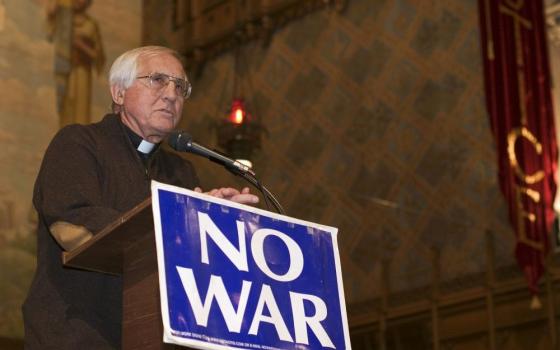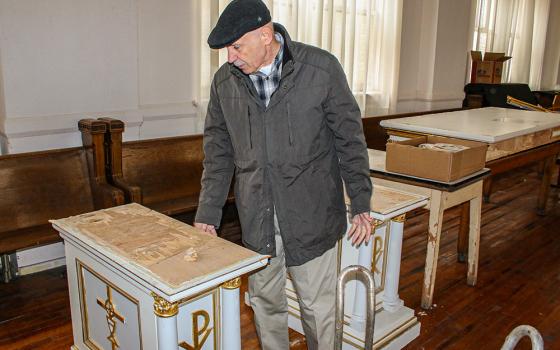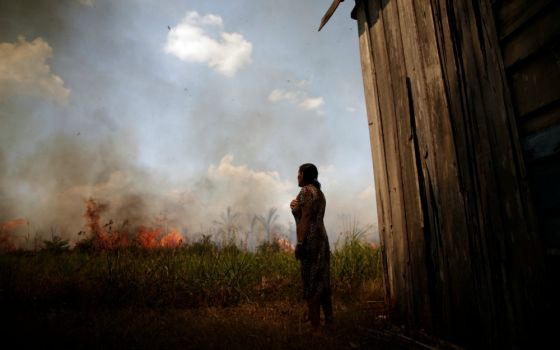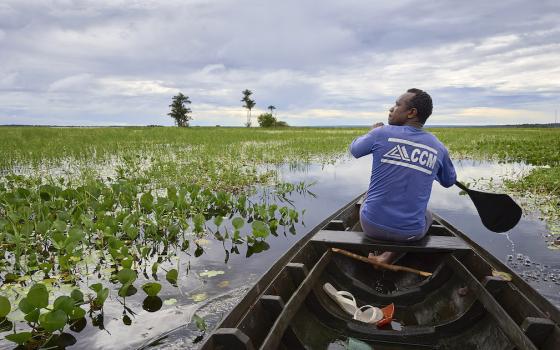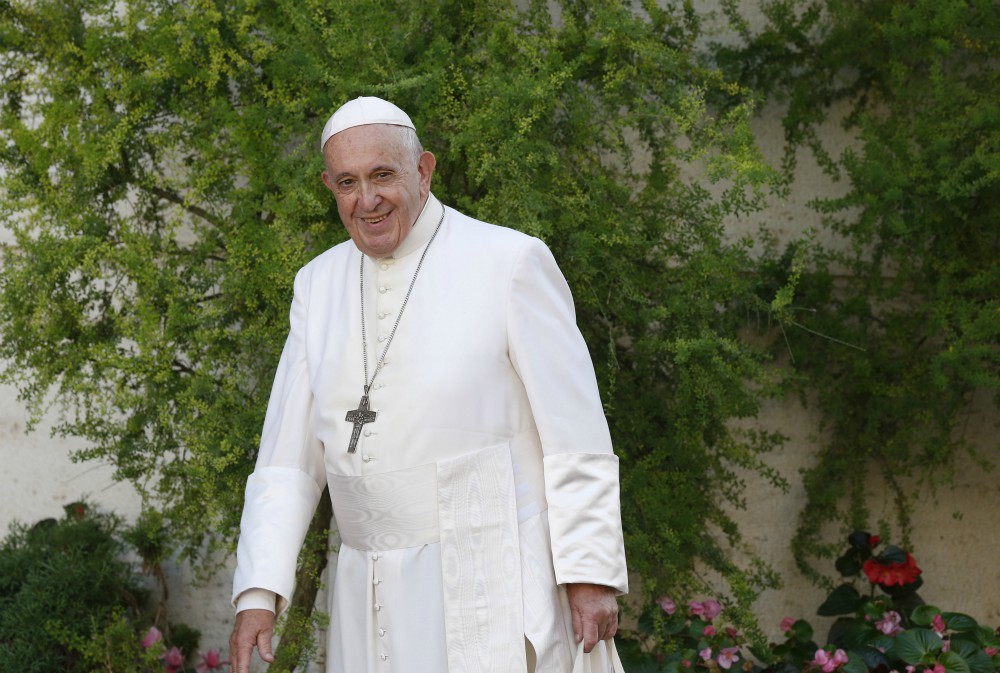
Pope Francis arrives for the final session of the Synod of Bishops for the Amazon at the Vatican in Oct. 26, 2019. (CNS/Paul Haring)
Pope Francis' post-synodal apostolic exhortation is only the beginning of the story. As church conservatives and progressives take to the internet and supposed neutral writers enter their own spins, everyone is forgetting about the forest and the trees. It is about the Amazon Basin, not about married priests or women deacons.
Except it is.
There are several layers to this fine document, which teaches everything is interrelated. God is present in the Amazon, in creation and in creatures. Angry forces seek to destroy both. Rooted in power and greed, their tentacles strangle the peoples and the land. The devil, indeed, is in the details: slavery, drugs, human trafficking, clear-cutting, water hoarding.
Rape of the Earth echoes in the lives of the peoples.
The stories are not new. Francis recalls the indigenous peoples of Venezuela, abused by rubber trade bosses nearly 50 years ago: "The ye'kuana women were raped and their breasts amputated, pregnant women had their children torn from the womb, men had their fingers or hands cut off ..."
Is this happening today? Do we really know what is going on in the Amazon? The people and their bishops came to Rome and spoke (or tried to speak) of what they wanted, what they needed. Francis said he heard them, and he has written his response.
What can save the Amazon? What can salve its suffering? What can bring it health and life? For Francis, it is the Gospel and it is the Eucharist.
But how, you ask. How bring the Gospel and the Eucharist to peoples bereft of priests?
Francis suggests more deacons and lay ecclesial ministers recognized by their bishops to run parishes, as well as more priests from the Amazon and elsewhere.
At this, the right and left initiate their independent field days. "No married priests! No women deacons!" the right proclaims triumphantly. The left says pretty much the same, but in desultory, even angry, tones.
Hello? This is an apostolic exhortation, not a motu proprio, and it is certainly not an apostolic constitution nor is it an encyclical. What's the difference? Apostolic exhortations neither clarify doctrine nor make law. That occurs, at various levels, with an apostolic constitution, a papal encyclical or a motu proprio.
The post-synodal apostolic exhortation Querida Amazonia is Francis' response as bishop of Rome to the final document of the Amazon synod. He presents both the exhortation and the final document from his diocesan cathedral, St. John Lateran, not from St. Peter's Basilica.
If the pope is going to do anything about married priests and women deacons, he will — actually, he must — use another type of document.
The American poet e.e. cummings once wrote: "Always the beautiful answer who asks a more beautiful question." It is time to ask the questions. In fact, a bishop or a bishops' conference must ask to restore the traditions of married priests and woman deacons.
Advertisement
For example, if the bishops of the Amazon, together or individually, formally request married priests, they must write and ask permission for a derogation from the law. Similarly, if they wish to recognize the diaconal ministry of women through ordination, they must ask formally. Does the final document already ask for these? It seems to, but it is not the formal request of a bishop or bishops' conference.
The final document says quite plainly that a large number of the language groups requested the permanent diaconate for women. The majority request for married priests seems restricted to ordaining married deacons who have served for some time. Married priests and women deacons are historically documented, doctrinally possible and pastorally necessary. They were recommended by the synod.
But the apostolic exhortation is not the answer. Nor can it be. The formal response to the disciplinary questions about ordaining married men as priests or women as deacons can come only as the response to a formal request. The answer would most likely come in a motu proprio modifying canon law.
Querida Amazonia is the pope's heartfelt commentary on the situation as it is. It is up to the people of God to continue to ask for what they need, and up to the bishops to act on their behalf.
[Phyllis Zagano is senior research associate-in-residence at Hofstra University in Hempstead, New York. She will speak Feb. 21-22 at the Los Angeles Religious Education Congress in Anaheim, California and Feb. 28 at the Catholic University of Leuven, Belgium. Her books include Women Deacons: Past, Present, Future (in Spanish as Mujeres Diaconos: Pasaso, Presente, Futuro), published in France and Canada as Des femmes diacres and in Portugal as Mulheres diáconos: Passado, presente, futuro. Study Guides are available for free download at https://sites.hofstra.edu/phyllis-zagano/. Her most recent book is Women: Icons of Christ.]
Editor's note: We can send you an email alert every time Phyllis Zagano's column, Just Catholic, is posted. Click here to sign up for email alerts.

